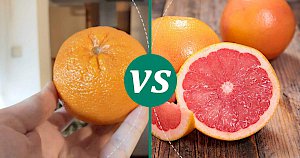Grapefruit vs Orange: Nutrition & Calories Compare


Grapefruit vs Orange
Nutrition Facts
Serving size:
change
5g10g15g20g30g40g50g60g80g100g120g140g160g180g200g220g250g300g350g400g450g500g600g700g800g900g1000g
1oz2oz3oz4oz5oz6oz7oz8oz10oz12oz15oz20oz25oz30oz35oz40oz50oz
Amount Per Serving:
Serving size:
change
5g10g15g20g30g40g50g60g80g100g120g140g160g180g200g220g250g300g350g400g450g500g600g700g800g900g1000g
1oz2oz3oz4oz5oz6oz7oz8oz10oz12oz15oz20oz25oz30oz35oz40oz50oz
Amount Per Serving:
Grapefruit vs Orange 100g Compare
| per 100g | Grapefruit | Orange |
|---|---|---|
| Calories | 42 | 47 |
| Carbohydrates | 10.66 g | 11.75 g |
| Fat | 0.14 g | 0.12 g |
| Saturated fat | 0.02 g | 0.02 g |
| Dietary fiber | 1.6 g | 2.4 g |
| Protein | 0.77 g | 0.94 g |
| Water | 88.06 g | 86.75 g |
| Calcium | 22 mg | 40 mg |
| Iron | 0.08 mg | 0.1 mg |
| Magnessium | 9 mg | 10 mg |
| Potassium | 135 mg | 181 mg |
| Vitaminium A | 1150 µg | 225 µg |
| Vitaminium B1 (Thiamine) | 0.043 mg | 0.087 mg |
| Vitaminium B2 (riboflavin) | 0.031 mg | 0.04 mg |
| Vitaminium B3 (Niacin) | 0.204 mg | 0.282 mg |
| Vitaminium B5 | 0.262 mg | 0.25 mg |
| Vitaminium B6 | 0.053 mg | 0.06 mg |
| Vitaminium B9 (Folic acid) | 0.013 mg | 0.03 mg |
| Vitaminium C | 31.2 mg | 53.2 mg |
| Vitaminium E | 0.13 mg | 0.18 mg |
Discover the Nutritional Gems: Grapefruit and Orange
When it comes to citrus fruits, grapefruits and oranges stand out not only for their distinctive tastes but also for their impressive nutritional profiles. Both fruits are celebrated for their refreshing flavors and health benefits, making them a favorite choice for a nutritious snack or a flavorful addition to various dishes. Before diving into the comparison between grapefruit and orange, let's explore some fascinating facts about these citrus wonders.
Grapefruits, with their slightly tart and tangy flavor, are often associated with weight loss and have a storied history of being part of various diet plans. On the other hand, oranges are universally loved for their sweet, juicy taste and are synonymous with vitamin C. But there's more to these fruits than meets the eye.
A Closer Look at Nutrition
When comparing the nutritional content of grapefruit and orange, it's evident that both fruits are low in calories but packed with vitamins and minerals. Here's a quick breakdown of their nutritional values per 100 grams:
- Calories: Grapefruit has 42 calories, while orange has 49 calories, making them both excellent choices for those monitoring their calorie intake.
- Carbohydrates and Fiber: Oranges offer slightly more carbohydrates and fiber than grapefruits, with 11.89 grams of carbs and 2.5 grams of fiber compared to grapefruit's 10.7 grams of carbs and 1.7 grams of fiber.
- Vitamins and Minerals: Oranges tend to have higher levels of vitamins and minerals, including vitamin C, calcium, and potassium. However, grapefruits are not far behind and boast a significant amount of vitamin A.
Both fruits have negligible amounts of fat and no cholesterol, making them heart-healthy choices. The glycemic index (GI) of grapefruit is slightly lower than that of oranges, which may be beneficial for blood sugar control.
Health Benefits Galore
Beyond their basic nutritional content, grapefruits and oranges offer a plethora of health benefits. The high vitamin C content in oranges is excellent for boosting the immune system, while the flavonoids present in grapefruits can help reduce the risk of certain diseases. Both fruits are rich in antioxidants, which fight free radicals and offer anti-inflammatory properties.
The fiber content in both fruits promotes digestive health and aids in maintaining a healthy weight. Moreover, consuming fruits like grapefruit and orange can improve heart health due to their potassium and magnesium content, which help regulate blood pressure.
Which One to Choose?
Deciding between grapefruit and orange ultimately depends on personal preference and specific health goals. If you're looking for a fruit with lower calories and a slightly lower glycemic index, grapefruit might be the way to go. On the other hand, if you prefer a sweeter taste with higher vitamin C and calcium content, oranges are your best bet.
Regardless of your choice, incorporating either of these citrus fruits into your diet can contribute to a well-rounded, nutritious eating plan. Whether you enjoy them as a standalone snack, juice, or as part of salads and dishes, grapefruits and oranges are versatile fruits that can enhance your health in delicious ways.
In conclusion, while grapefruits and oranges have their unique nutritional profiles and health benefits, both are excellent additions to a healthy diet. By understanding the differences and similarities between these two fruits, you can make informed choices that suit your nutritional needs and taste preferences.
Grapefruit 100g
42kcalCalories source
- 91% CARBS.
- 7% PROTEIN
- 3% FAT
Orange 100g
47kcalCalories source
- 91% CARBS
- 7% PROTEIN
- 2% FAT
Compares of grapefruit
- Grapefruit vs Apple
- Grapefruit vs Apricot
- Grapefruit vs Avocado
- Grapefruit vs Banana
- Grapefruit vs Blackcurrants
- Grapefruit vs Melon
- see all compares of grapefruit
Compares of orange
Read also:
- Calories from Grapefruit
- Calories of Guava
- Calories in Jackfruit
- Jujube calories per 100g
- Kiwi protein per 100g
- How many calories does kumquats have?
- Calories in a half of loquat fruit
- Calories in whole loquat fruit
- Calories for one, two or more Loquat fruits
- Calories in handful of Loquat fruits
- How much protein in lychee?
Marcin Piotrowicz
calories-info.com creator
Healthy diet and healthy lifestyle promoter
Add comment